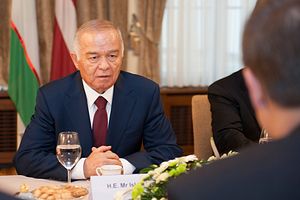Islam Karimov is the granddaddy of Central Asian succession questions. At 78, the region’s oldest ruler has been the subject of almost annual health-scare rumors. Every two-week absence from public appearances in recent years–in 2015 and in 2013, for example–touched off a swirl of ill-health and even death rumors. Karimov is said to have heart and respiratory problems, but details are few and far between–the government never confirms them.
On August 28, however, Uzbek officials appeared to have done just that. A statement published in Gazeta, the official state newspaper, from the Cabinet of Ministers, said Karimov had been hospitalized and was “receiving medical treatment.” The statement did not say how long he’d stay in the hospital, only that it would “require a certain amount of time for medical assessment and treatment.”
Fergana News reported that Karimov had either a heart attack or a stroke Saturday night and that a well-known Russian heart surgeon, Leo Bokeria, had flown from Moscow to Tashkent to treat him. Bokeria has visited Karimov several times over the years.
Some see the unprecedented confirmation by the government that Karimov is ill as an indication of the severity of his condition. That very well may be true. Most likely, the push to confirm rumors of his illness–RFE/RL says its Uzbek service began getting unconfirmed reports that Karimov had been ill for “several days” on August 27–comes from the fact that Karimov has a very public appearance pending.
Karimov, who was elected first secretary of the Communist Party of the Uzbek Soviet Socialist Republic in 1989, declared the country’s independence on September 1, 1991. He was soon after elected president of the newly independent state and reelected in every sham election since. He’s attended every Independence day celebration; an absence would have poured kerosene on the flaming rumor mill. So while acknowledging Karimov’s ill-health will invariably get regional analysts talking, that would have happened anyway had he mysteriously skipped the festivities later this week.
The next question is obvious: Who is next in line? One of the big criticisms of Central Asia’s governments from regional watchers is the lack of succession plans. Leaders like Karimov have spent a quarter century consolidating power into their own hands, often in a violent fashion. For some time, it was assumed that Karimov was grooming his daughter Gulnara for his job, but those notions have vanished with Gulnara herself. Karimov’s other daughter, Lola, doesn’t seem to be well placed for a dynastic transition, either. There are a few men with the experience and clout: Prime Minister Shavkat Mirziyoyev and Rustam Azimov, deputy prime minister and finance minister, for example, as well as Rustam Inoyatov, the head of the National Security Service since 1995.
There are few models for succession in Central Asia, and each country has its own internal power dynamics that make comparing them in this respect difficult. When Turkmenistan’s first president Saparmurat Niyazov died in 2007, the transition scramble was held behind closed doors and quietly the health minister Gurbanguly Berdimuhamedov stepped into the presidency. Kyrgyzstan has perfected presidential shifts via popular revolt, though is aiming to hold a clean presidential election and handover next year.
Some also worry that any kind of succession struggle could open the door to extremists. Uzbeks need only look south to Afghanistan for a preview of what that could look like.
September 1 is the day to watch. Karimov’s potential absence will be less shocking now only because the government has acknowledged his illness. Nevertheless, a new phase of Uzbek politics may begin, at least deep in the dark halls of power where elites and criminals orchestrate the state’s movements. Karimov has always been at the top, but he’s remained there because he co-opted and convinced–brutally–those below him to follow along. Even if Karimov recovers, death comes for us all in the end and Uzbekistan’s next president is somewhere, counting the days.

































